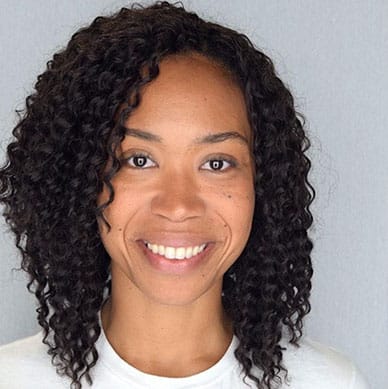By: Chanel Williams, Human Resources professional and AHF’s Social Media Lead
As we continue our Black History Month series, I had the pleasure of sitting down with Shavonne (Shav) Hasfal-Mcintosh to discuss the important role she plays in creating social change within her community. Shav is the Diversity and Belonging Lead at Shopify and also a member of AHF’s Advisory Group. Shav devotes her time to helping businesses and communities dismantle systems of oppression in and beyond the workplace. As a change leader, her work is powerful and has been recognized throughout the City of Toronto.
Daily Hive recently named her one of the top Black business leaders you should know — and we definitely agree!
During our time together, I was immediately comforted by her realness and passion for creating change, building communities and leaving behind a legacy for generations to come. I asked Shav a series of questions, and her answers truly aligned with our mission at AHF. Shav’s real talk covered organizational structures, a call to analyze our positioning within our communities and ways we can come together to create change.
Breaking Barriers and Creating Change
“My 16-year-old sister inspires me daily. We’re 21 years apart, and I remember when I was young, I would hear my parents talk about their experience navigating racism and discrimination in the workplace. As I started to grow up and face my own journey in the corporate world, I also had to navigate through my own instances of racism and discrimination in the workplace and thought there has to be a way to break the cycle,” recalled Shav. “I have to make this different for the generations that come up after me, and then my sister was born. She was the physical manifestation of my responsibility, and to this day, is my motivation to push this work forward. She inspires my commitment to disrupting, breaking barriers, and making sure that I am instilling change in these systems so that coming up for her is a little easier.”
This powerful message from Shav resonated with me. Coming from a big family, I also feel a sense of responsibility to change the way the world views them. Having experienced the uncomfortableness of being the only Black woman in the room, I have learned strategies that have helped me be seen and heard. When I can, I try to share my experiences and these strategies with other women in my family so they can create mechanisms of their own. I want them to know they are not alone and that there is power in recognizing our agency and resilience.
Inequity in the Workplace
I was curious to know Shav’s perspectives on how equity manifests in the workplace. “The thing we know about biases is that people are inclined to feel comfortable around folks who are like themselves, right? I can’t speak for every industry, but tech is predominantly White and male. So, in a lot of organizations when you look up and see the composition of leadership teams, it’s likely that it’s going to be homogenous, It’s just facts” explained Shav. “The mere fact that people who are coming to your organization can’t look up and see folks who look like themselves is just one fundamental way that inequality manifests itself.”
You can’t begin to address inequality within an organization, Shav explained, until leadership teams exhibit a willingness to explore, understand and admit the role their organizations may have played in perpetuating systems of oppression and racism. “This first crucial step is often missed or people are not willing to create the space to have those difficult conversations with themselves and as a collective. I always say ego has no place in this work and until you are willing to move through the discomfort, to embark on your learning journey, it will be difficult to come to a place where you can intentionally build a truly diverse, equitable and inclusive environment. There is no way around this work, there is only through it.”
Listening to Shav, I reflected on how in many industries, White men hold more seats on the leadership team than women. And where women hold leadership positions, fewer of these women are racialized. The lack of representation at decision making tables at all levels sets the tone of an organizations’ culture. When we are willing to create space for honest reflection and have difficult conversations about systems of oppression, racism and bias as a foundation, it can be a very powerful step toward building equitable, inclusive and just environments.
Advice for Early-career Black Women
“As I always tell my sister, don’t sell yourself short and know that you are capable of anything. Black girl magic, Black magic, and Black excellence are all very real things, they aren’t just hashtags. Be confident in your voice and abilities,” Shav exclaimed. “Remember to take up space and advocate for yourself. Find yourself mentors and sponsors who you can trust to help guide your career. It is so important not to lose sight of what you want and deserve because you are worthy. And take care of yourself, body, mind and soul, as you navigate the corporate world.”
We echo this great advice at AHF! Black excellence, leadership and innovation are real. We strive to give young women of colour within our community the opportunity to connect with mentors, create allies and create the conditions for gaining sponsors. These are important aspects in creating change, building a career we love and knowing that we are deserving of all the possible opportunities out there to thrive and flourish.
Celebrating Black Women
As this month is about celebrating, I asked Shav if there are any Black women leaders that she’d like to celebrate. “Karlyn Percil and Vivian Kaye immediately came to mind,” exclaimed Shav. “They’re authentically themselves. And they’re always real talk, they said what they said, and they’re always bringing the community alongside with them.” We second that! If you follow Vivian Kaye, then you know her trademarked phrase “What would Chad do?”
Shav also recognized Kike Ojo-Thompson, Founder of The Kojo Institute. “Kike is so steadfast in her commitment to this work. Just seeing the way she is really digging her heels in to create systemic change and holding people accountable is inspiring.”
Lastly, Shav wanted to take some time to celebrate her parents. “My mom is the epitome of a Black Queen. She dedicated her life to building community, supporting and amplifying the voices of all the Black women around her. She’s so powerful. My dad is one of the most resilient and business savvy entrepreneurs I know. He instilled in both my sister and I from day one that Black is beautiful, Black is excellence, and that even when the world tries to convince us otherwise, to never forget those things.”
My Reflections
As a woman of colour, Shav’s words stuck with me on many levels. I have to continue to disrupt in order to break barriers for my niece, cousins and all other women of colour who have come after me. My work is not yet complete. Building women up, showing them that they are not a product of their environment, and allowing them to take the reins of their careers is the legacy I hope to leave behind. I want to encourage all women of colour to step into their power because there is something so beautiful in recognizing you are capable and fully deserving of all the possibilities, opportunities, and your big dreams.
My conversation with Shav reminded me of the importance of balancing doing the work with taking time for self-care. Balancing addressing the inequities and injustices that Black communities have faced with remembering and celebrating Black beauty, Black joy, Black jubilance, Black excellence! Here, here!



